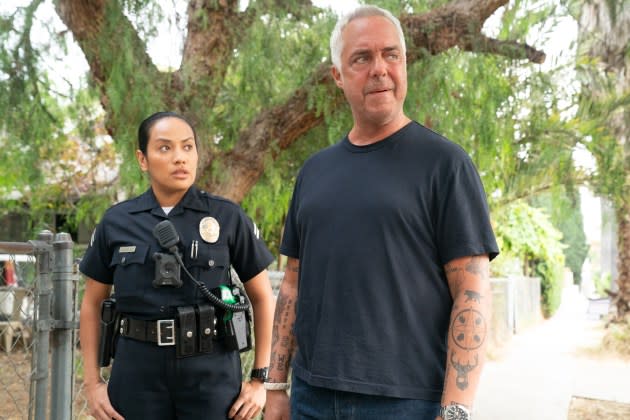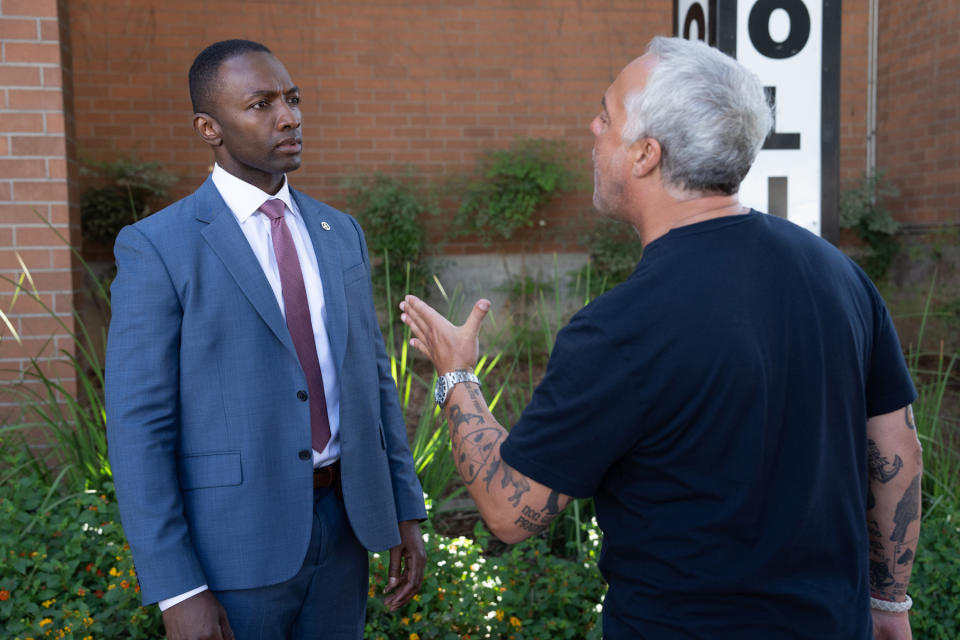‘Bosch: Legacy’ Is Still Rock Solid Dad TV

In an upcoming episode of Bosch: Legacy Season Two, private investigator Hieronymus “Harry” Bosch (Titus Welliver) asks a favor of a couple of colleagues from his days as an LAPD homicide detective. Their exchange is terse and extremely one-sided in favor of the self-righteous Bosch. As he walks away, Christina Vega (Jacqueline Obradors) mutters, “Same old Bosch.”
“Same old Bosch” might as well be the actual title of Bosch: Legacy, which is among the least spinoff-y of spinoffs ever made(*). It brings back the hero of Bosch as its main character. His daughter Maddie (Madison Lintz) remains prominent, and she now works as a rookie uniform cop at the same Hollywood precinct that was the setting of the earlier series. Defense attorney Honey Chandler (Mimi Rogers) has been promoted from periodic guest star to main character (as Harry’s primary client), while the opposite has been true for all the other Bosch cops like Vega and Harry’s old partner Jerry Edgar (Jamie Hector). But even though Harry no longer has a badge, he’s still going after killers and scoundrels, often with the help of his old pals from Hollywood station.
More from Rolling Stone
'The Delinquents' is a Heist Movie That Demands You Quit Your Job ASAP
Seoul's Halloween Crowd Crush Killed 159 People. Police Ignored It.
(*) Its only serious competition for the top spot is Archie Bunker’s Place, which continued the set-up from the final seasons of All in the Family, but for the most part only had Archie and his niece continuing from the original show.
Honestly, it feels like the biggest change isn’t the expanded name, the tweaked cast, or Bosch’s new career, but the fact that Original Recipe Bosch was on Amazon Prime Video, while Legacy is on sister streamer Freevee, where episodes are periodically interrupted by ad breaks.
In the Michael Connelly books that introduced Bosch and inspire most of the TV stories, Harry has gone back and forth between the LAPD, private work, and even a part-time job with a smaller police force in the Valley. So the professional shift is in keeping with the source material and the creative spirit of the whole endeavor. Really, though, this is about business. TV shows get more expensive with each passing season, because the various Hollywood guilds have annual raises built into their contracts. It’s why some shows like Breaking Bad and Stranger Things refer to two batches of episodes that are produced and released separately as halves of a single “season.” And it’s why Bosch: Legacy exists, rather than the old show following Harry down this new path. Starting over under a new name resets the salary structure(*).
(*) This happens from time to time, whether a TV show is essentially continuing with everyone but the original show’s lead performer (The Closer became Major Crimes when Kyra Sedgwick left) or when the opposite happens (The Practice became Boston Legal, ditching almost everyone from the final Practice season’s cast other than James Spader).
But if Bosch: Legacy is a bit odd in terms of how and why it exists, it continues to be a reassuring example of Dad TV(*) executed at a very high level. The new season tweaks the formula in a few ways, some more welcome than others. But when a frustrated former colleague of Harry’s vents, “Fucking Bosch,” it fits as neatly here as it did whenever someone used the phrase on the old show.
(*) i.e., competence porn about middle-aged professionals, mostly men (with exceptions like The Diplomat), and often based on books.
Season One ended on a cliffhanger: Maddie was stalked and then kidnapped by Kurt Dockweiler, a Los Angeles city employee who was also a serial rapist referred to by cops as the Screen Cutter(*). Where Bosch seasons tended to be mostly self-contained adaptations of the plot of one or more Connelly novels, this one has to continue not only the abduction plot, but fallout from some illegal shenanigans Harry, Honey, and Harry’s new hacker sidekick Mo (Stephen Chang) pulled back in Season One.
(*) In Season One, Dockweiler was played by actor Will Chase. The new season now features Office alum David Denman as Dockweiler, and there are even a few reshot scenes featuring Denman for the “Previously, on Bosch: Legacy” season-opening montage. But if you, like me, don’t pay attention to those clips, you may be very confused by Denman’s presence, in the same way that many Better Call Saul viewers were when that show, between seasons, had to recast the shady Omaha cab driver who was threatening to expose Gene from Cinnabon’s true identity.
The Screen Cutter story unfortunately veers into territory that Bosch mostly left behind after its mediocre first season, with an evil mastermind taunting Harry and the cops at every turn. The original show got better in a hurry when it began leaning away from that kind of cliched “awesome criminals are awesome” nonsense, and Dockweiler is too much in that tired vein. The Harry/Honey/Mo story, on the other hand, feels natural as a continuation, if only because the trio and friends blew up a gas pipeline, and that’s the sort of thing that you’d expect to attract attention from law-enforcement at various levels.

But there’s new business, too, with a season-long arc inspired by Connelly’s novel The Crossing, where Harry and Honey(*) attempt to prove that the LAPD has arrested the wrong man for murder, while a pair of shady vice cops show an unusual level of interest in the case.
(*) The book is one of several where Harry teams up with his half-brother Mickey Haller, aka the star of The Lincoln Lawyer and its sequel novels. Because the rights to the two book series were sold separately — Manuel Garcia-Rulfo plays Haller on Netflix’s Lincoln Lawyer show — Honey fills his role in this particular story.
That Crossing plot in some ways illustrates the biggest difference between the new-ish show and its old-ish predecessor. With Harry as a civilian, with Maddie as a rookie just learning how the LAPD functions, and with a defense attorney as one of the three leads, Legacy is able to take a more jaundiced view of policework than Classic Bosch tended to. Some of that crept into the final Bosch season (the only one to be produced after the police killings of George Floyd, Breonna Taylor, and other citizens of color began shifting public and pop-culture views on policing), but it’s a more prominent feature here.
Because Harry is the protagonist, the show is usually on his side. (And when it’s not, it’s on the side of Maddie, whose last name also happens to be Bosch, and who has an argument for being the true title character here, since she’s Harry’s legacy.) So the fact that he runs afoul of the LAPD even more than he did when he was on the job is in some ways just par for the course of how series television operates. But the sense that law-enforcement has fundamental blind spots, and that the judgment of even veteran cops shouldn’t automatically be trusted, is much more palpable here than it ever was in the franchise’s earlier TV years.
Mostly, though, Bosch is Bosch, with or without the subtitle, wherever you can stream it. At one point, when Maddie hears her father talking just like he did when he was still on the force, she asks him to remind her when he’s really going to retire.
“When people stop killing each other,” he replies.
Sounds right for Bosch by any name.
The first four episodes of Bosch: Legacy Season Two are streaming now on Freevee, with two additional installments releasing weekly through November 10. I’ve seen all 10 episodes.
Best of Rolling Stone
